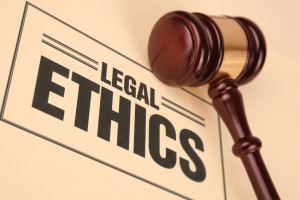Hi!
It’s been a bit since my last post. Usually when I go on hiatus it’s because of blogger’s block. Not this time. For the past 10 days, I’ve been tied up with a special assignment. That behind me, it’s good to be back.
And speaking of back . . . it’s back to school season. Around this blog, that means it’s back to (trust account) school season. And, as a reminder that the lessons aren’t in the abstract, I’m going to mention two decisions handed down earlier this year in which Vermont lawyers were publicly reprimanded for violating the trust accounting rules.

I’ll address the decisions in reverse order of issue. Why? Because the first is a stark reminder that failure to comply with the trust accounting rules can easily lead to a suspension.
PRB Decision 236 involved a sole practitioner whose practice focuses on residential real estate transactions. A disciplinary complaint resulted in Disciplinary Counsel conducting a compliance audit of the lawyer’s trust account. The audit revealed that the account often went unreconciled and that to the extent that the lawyer maintained records, they were substandard. Among other things, the lack of regular reconciliation caused the lawyer to fail to account for numerous uncashed checks that had been issued against the trust account.
In addition, the lawyer is a title insurance agent. For those of you who don’t know, lawyers who sell title insurance collect the premium at closing and deposit it into trust. Following the closing, the lawyer/ conducts a title update so that a final policy can issue. Then, the lawyer disburses both the title insurer’s share of the premium and the lawyer’s share.
Here, the lawyer wasn’t doing that. Rather, the lawyer admitted that there were approximately 30 closings at which the lawyer had collected the title insurance premium but not issued a final policy or disbursed the title insurance company’s share of the premium. The former is bad because it’s neglect, the latter is bad because, in this situation, the title insurance company is no different than any other person who is entitled to funds that an attorney is holding in trust.
In the end, a hearing panel concluded that the lawyer violated:
- the trust account record-keeping rules;
- the rule that requires timely reconciliation of a trust account;
the rule that requires prompt disbursement of funds that belong to another; and,
- the rule that requires lawyers to provide clients with prompt and diligent representation.
I’ve previously blogged on how the hearing panels and Supreme Court arrive at a disciplinary sanction. In a nutshell, an analysis of several factors results in a presumptive sanction that can be modified up or down by certain aggravating and mitigating factors.
Here, the panel concluded that the presumptive sanction was a suspension of the lawyer’s law license. However, the panel went on to conclude that the mitigating factors outweighed the aggravating and warranted the lesser sanction of a public reprimand. Neither Disciplinary Counsel nor the lawyer appealed, and the Supreme Court issued an order adopting the hearing panel’s decision as its own.
The second decision is PRB Decision 235. The case involved a lawyer at a small firm whose practice focused on estate planning and residential real estate. A compliance audit of the firm’s trust accounts revealed problems associated with years of failing to reconcile the accounts. Thus, accounting errors and uncashed checks went undetected.
In the end, a hearing panel concluded that the presumptive sanction was a public reprimand. The panel also found that the mitigating factors outweighed the aggravating, and that many of the problems with the firm’s trust accounting pre-dated the lawyer’s responsibility for the accounts. Still, the panel opted against reducing the sanction from reprimand to admonition, noting that the lawyer “allowed those problems to languish and was directly responsible for repeated failures to conduct reconciliation and for failing to address and correct accounting errors that arose . . .” Neither Disciplinary Counsel nor the lawyer appealed, and the Supreme Court issued an order adopting the panel’s decision as its own.
These opinions show that, as has been the case for years, the failure to mind the trust account will result in discipline. For those of you interested going “back to (trust account) school,” see the resources below.
As always, let’s be careful out there.
PS: as I cut & pasted the links, I LMAO’d thinking about the person who recently told me that I don’t do enough on trust accounting.
Resources
- The Professional Responsibility Program’s Guide to Managing Trust Accounts
My videos on trust accounting:
- Don’t Fear, Simplify. (25 minutes)
- Basic Requirements(41 minutes)
- Contingent Fees, Referral Fees & Fee Sharing(22 minutes)
- Flat Fees, Misappropriation & Trust Account Scams(35 minutes)
- Collecting & Disbursing Funds(33 minutes)
My blog posts on trust accounting:
- Safeguarding Client Funds: Tech Competence & Mobile Payment Apps
- Taylor Swift & Trust Accounts: Don’t Say I Didn’t Warn Ya
- Disbursing without Collected Funds
- Mobile Payments & Legal Fees
- Trust Accounting Tips
- Trust Account Scams Continue
- T.I. & Jack Torrance: an overview of the trust account rules
- Third-Party Claims against Client Funds
- With trust accounts, verify
- Misappropriation: Don’t.
- Trust Account Tuesday: Nonrefundable fees
- Teddy KGB on prompt notification and delivery
- When a third-party asserts an “interest” in funds held in trust
- Trust Account Tuesday: (generally) don’t disburse absent collected funds.
- Trust Accounting: Basic Requirements
- Trust Account Tuesday: Don’t Commingle
- Trust Accounts & ACH Transfers
- Trust Account Scams: Change in Wire Instructions? CAUTION!!!!
- Don’t overcomplicate trust accounting.





